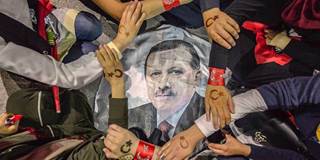Ever since Turkish President Recep Tayyip Erdoğan won his first general election in late 2002, he has been obsessed with the idea that power would be wrested from him through a coup. That obsession helps explain the widening repression and rapid descent into lawlessness since July's failed putsch.
CAMBRIDGE – Ever since Turkish President Recep Tayyip Erdoğan won his first general election in late 2002, he has been obsessed with the idea that power would be wrested from him through a coup. He had good reason to worry even then. Turkey’s ultra-secularist establishment, ensconced in the upper echelons of the judiciary and the military at the time, made no secret of its antipathy toward Erdoğan and his political allies.
Erdoğan himself had been jailed for reciting religion-laced poetry, which prevented him from taking office immediately when his Justice and Development Party (AKP) assumed office in November 2002. In 2007, the military issued a statement opposing the AKP’s candidate for president – then largely a figurehead. And in 2008, the party narrowly escaped being shut down by the country’s top court for “anti-secular activities.”
The old guard’s efforts largely backfired and served only to augment Erdoğan’s popularity. His strengthening grip on power might have mollified him and led to a less confrontational political style. Instead, in the ensuing years, his then-allies the Gülenists – followers of the cleric-in-exile Fethullah Gülen – managed to whip Erdoğan’s obsession into paranoia.

CAMBRIDGE – Ever since Turkish President Recep Tayyip Erdoğan won his first general election in late 2002, he has been obsessed with the idea that power would be wrested from him through a coup. He had good reason to worry even then. Turkey’s ultra-secularist establishment, ensconced in the upper echelons of the judiciary and the military at the time, made no secret of its antipathy toward Erdoğan and his political allies.
Erdoğan himself had been jailed for reciting religion-laced poetry, which prevented him from taking office immediately when his Justice and Development Party (AKP) assumed office in November 2002. In 2007, the military issued a statement opposing the AKP’s candidate for president – then largely a figurehead. And in 2008, the party narrowly escaped being shut down by the country’s top court for “anti-secular activities.”
The old guard’s efforts largely backfired and served only to augment Erdoğan’s popularity. His strengthening grip on power might have mollified him and led to a less confrontational political style. Instead, in the ensuing years, his then-allies the Gülenists – followers of the cleric-in-exile Fethullah Gülen – managed to whip Erdoğan’s obsession into paranoia.